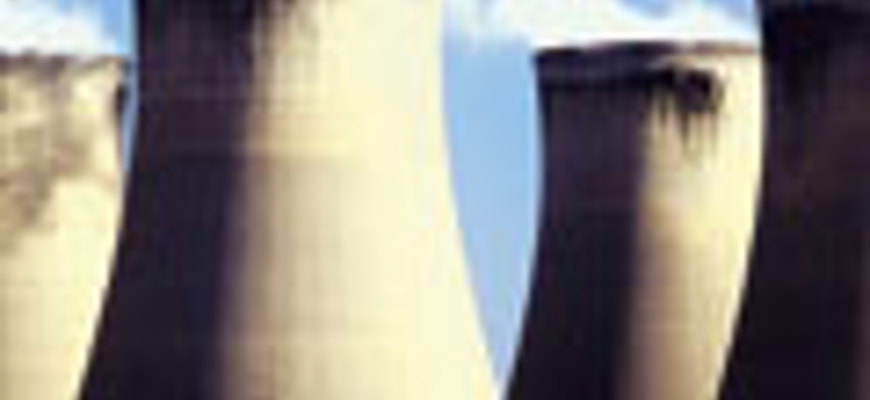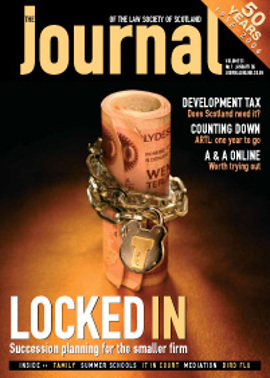Nuclear power no thanks?

Pity Tony Blair. His recent announcement of a review of UK energy policy has fanned the flames of a debate which has been raging for several months and may become one of the biggest UK political issues in the next few years. Recent events have also put energy policy at the top of the political agenda, with a forecast hard winter, spiralling oil and gas prices, exploding oil refineries and increasingly volatile global weather adding to concerns over global climate change. But perhaps, having avoided changing energy policy at the time of the war in Iraq, the Prime Minister believes the UK’s future energy requirements simply cannot be ignored any longer and recent events show a review is timely. What is already particularly controversial is the realisation that further nuclear power stations in the UK are now a real possibility.
Pity Jack McConnell, if you will, whose political leader was announcing the possible rebirth of the UK nuclear industry while Scottish policy remains that ministers are not prepared to consider more nuclear power stations “until the issue of waste is successfully resolved”. Some experts believe that could take 20 years. Could Scotland refuse to build new nuclear power stations when energy policy is reserved to Westminster but responsibility for the planning system is devolved to Holyrood? Legally speaking, it appears the Scottish Ministers could do just that.
The final say
Any application to build a nuclear power station in Scotland must be made under section 36 of the Electricity Act 1989. However, the application is made to and determined by the Scottish Ministers by virtue of regulation 2 of the Scotland Act 1998 (Transfer of Functions to the Scottish Ministers etc) Order 1999. Also with any section 36 application the relevant local authority may trigger a public inquiry if it formally objects. Experience suggests that holding such an inquiry will alone add several years and huge cost to a nuclear proposal, and the ultimate arbiter is still the Scottish Ministers. So one side effect of devolution is that legally Scotland could say “Nuclear Power No Thanks”. However, whether that is likely to happen is not simply a question of party politics and the potential imposition of superior orders by Mr McConnell’s leader.
The renewable deficit
All but one of the UK’s nuclear generators will be shut by 2023 (Chapelhall in Dumfries & Galloway has already closed, Hunterston B in Ayrshire will close in 2015 and Torness in East Lothian will close by 2023). Nuclear power currently produces approximately 20% of the UK’s electricity but this share will reduce rapidly as existing plants close. In 2004 the UK’s electricity came from gas (40%), coal (33%), nuclear (19%), oil (1%), hydro-electric and other renewable sources (5%) and imports (2%). Scotland has higher proportions of hydro-electric and renewable generation, largely due to existing large hydro-electric schemes. However, even the current drive for more renewable energy only aims to achieve a 20% share for renewables by 2020, by which time the current 20% nuclear generation will have disappeared. Therefore current initiatives favouring more renewable energy could still never fill the gap left by nuclear power and replace part or all of our existing fossil fuel generation.
This is not an argument against renewable energy. Rather, the UK is now largely reliant on imported gas from the EU, Norway and Russia, as illustrated by recent gas price increases, and imported coal. Supplies of oil are also diminishing. Protecting the UK’s energy supplies from being held to ransom (deliberately or otherwise) implies a future move towards nuclear and renewable energy at the expense of fossil fuels. This also accords with international and national climate change initiatives such as the Kyoto Protocol and the Renewables Obligation (Scotland) Orders 2002 to 2005 (SSI 2002/163, SSI 2004/170 and SSI 2005/185).
No easy options
Global issues such as nuclear security, terrorism, security of fuel supplies and climate change aside, the Scottish public certainly have views on more local issues such as nuclear waste, the location of nuclear stations and jobs. Whatever the pros and cons of nuclear power (and indeed of renewable energy) no easy options present themselves. If Mr McConnell maintains his current policy stance he has the legal powers, I believe, to prevent further nuclear power stations in Scotland. It would be a real test of the strength of Scottish devolution (and the Scottish political and legal systems) were he to do so. However, it would also take huge political courage and Scotland cannot yet simply swap fossil fuels for renewables anyway. So nuclear power certainly must be on Government agendas if the lights are to stay on. Pity Gordon Brown, if you will, who (may) inherit the political consequences of the forthcoming energy policy review...
Robin Priestley,
Planning & Environment,
Anderson Strathern
In this issue
- Pressing ahead
- Regulation, 2006 style
- Held to ransom?
- A world turned upside down
- Quiet revolutions
- For supplement read tax
- Why mediation is a bad idea, and other myths
- Advice in a Europe of many notions
- At the touch of a button
- What sort of courts do we want? (And when?)
- KM in practice
- If the bug bites
- Refreshing risk quiz
- The partnership must go on
- First duty to the court
- A difficult birth
- Nuclear power no thanks?
- Due diligence
- Will less mean better?
- Scottish Solicitors' Discipline Tribunal
- Website reviews
- Book reviews
- Back to the future
- Users' IT requirements for ARTL






